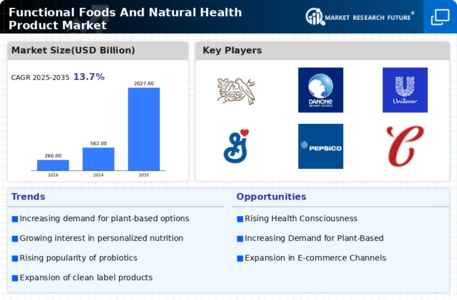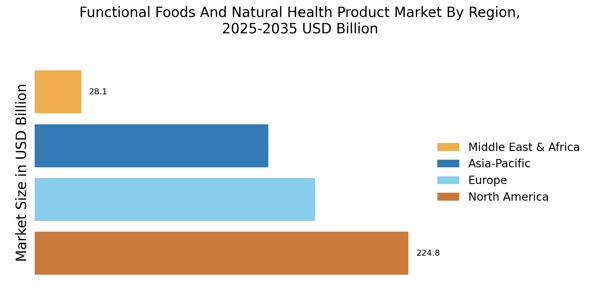Aging Population
The demographic shift towards an aging population is likely to have a profound impact on the Functional Foods And Natural Health Product Market. As the global population ages, there is an increasing focus on maintaining health and quality of life in later years. Older adults are more susceptible to chronic diseases, which drives the demand for functional foods that can help manage health conditions. Products that support cognitive function, joint health, and cardiovascular wellness are particularly sought after. Market data suggests that the segment of functional foods targeting seniors is expanding, reflecting the growing recognition of the role of nutrition in healthy aging. This demographic trend is expected to continue influencing the Functional Foods And Natural Health Product Market in the coming years.
Rise of E-commerce
The proliferation of e-commerce platforms is transforming the way consumers access products in the Functional Foods And Natural Health Product Market. Online shopping offers convenience and a wider selection of functional foods, allowing consumers to explore various options from the comfort of their homes. This shift has been accelerated by advancements in technology and changes in consumer behavior, with many preferring to purchase health products online. Data indicates that e-commerce sales in the health food sector are experiencing significant growth, suggesting that this channel will play a crucial role in the future of the Functional Foods And Natural Health Product Market. Retailers are increasingly investing in online strategies to capture this expanding market segment.
Growing Health Consciousness
The increasing awareness of health and wellness among consumers appears to be a primary driver for the Functional Foods And Natural Health Product Market. As individuals become more informed about the benefits of nutrition, they are actively seeking products that promote health and prevent disease. This trend is reflected in the rising demand for functional foods, which are perceived as beneficial for health beyond basic nutrition. According to recent data, the market for functional foods is projected to reach substantial figures, indicating a robust growth trajectory. Consumers are gravitating towards products that offer specific health benefits, such as improved digestion, enhanced immunity, and better heart health, thereby propelling the Functional Foods And Natural Health Product Market forward.
Focus on Preventive Healthcare
The emphasis on preventive healthcare is emerging as a key driver for the Functional Foods And Natural Health Product Market. Consumers are increasingly recognizing the importance of proactive health management, leading to a surge in demand for products that can help prevent health issues before they arise. Functional foods that offer preventive benefits, such as antioxidants and probiotics, are gaining popularity as individuals seek to enhance their overall well-being. Market analysis indicates that this trend is likely to continue, with consumers prioritizing products that contribute to long-term health. The shift towards preventive healthcare is reshaping the landscape of the Functional Foods And Natural Health Product Market, encouraging innovation and the development of new products.
Sustainability and Ethical Consumption
The growing concern for sustainability and ethical consumption is influencing the Functional Foods And Natural Health Product Market. Consumers are increasingly seeking products that align with their values, including those that are environmentally friendly and ethically sourced. This trend is prompting manufacturers to adopt sustainable practices in their production processes, from sourcing ingredients to packaging. Data suggests that a significant portion of consumers is willing to pay a premium for products that meet these criteria, indicating a shift in purchasing behavior. As sustainability becomes a priority for many, the Functional Foods And Natural Health Product Market is likely to see a rise in demand for products that not only promote health but also contribute positively to the environment.

















